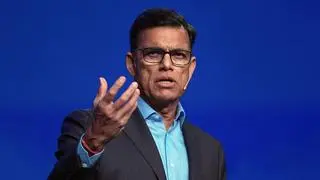EKI Energy Services Ltd came out with its IPO in November last year and raised a little over ₹ 18.60 crore, selling a share for ₹102. Today, its share is trading on BSE at around ₹878, giving its investors an eight-fold appreciation in less than a year. Its business tripled between 2019-20 and 2020-21 — from ₹66 crore to ₹191 crore; and net profits rose from ₹4.4 crore to ₹18.70 crore. In 2020-21, earnings on each EKI share was ₹37.2.
And, there are good reasons to believe that this is only the beginning. The real upsides will happen in the coming years and could be triggered by an international meet that is to take place in Glasgow, UK, in November. If events turn out favourably, you can bet your shirt on EKI.
The business model
Now, what is the Indore headquartered EKI Energy Services, and what is the business it is into?
The company specialises in facilitating trading in carbon credits. If you implement a project, say a solar farm, that will fight global warming, you will get ‘carbon credits’, which are market-tradable financial instruments. A carbon credit represents (usually) a tonne of carbon emission saved.
Those people, like industries in the developed West, for whom saving a tonne of carbon emission is expensive, simply buy these carbon credits from wherever saving a tonne of carbon is cheaper — as in India.
Some may remember the ‘certified emission reductions’, or CERs, that a lot of Indian companies received for their projects. Those were issued under a framework that the climate negotiators called ‘Kyoto protocol’, which has now (sort of) been replaced by the Paris Agreement. (That the value of the CERs has declined to near-nothing and is likely to be completely extinguished, is another story.)
After the Paris Agreement was signed in December 2015, countries set out to make rules for operationalising it. The Agreement formally came into force last December; all but rules for one aspect have been framed. The unfinished agenda is making rules for carbon markets, which is crucial because carbon markets are what spins money for climate change mitigation efforts.
The next Conference of Parties (CoP26) is scheduled to happen in Glasgow and many are hoping that the rules for the so-called Article 6, which deals with carbon markets, will come into being. That could mean the formal death of the CERs issued under the Kyoto Protocol. But, if that happens, a bright future awaits the climate warrior business, hopefully. Which carbon financial instruments will come into being is not clear; for now the carbon credits are called ITMOs, for Internationally Transferred Mitigation Outcomes. Earlier this month, a task force on Scaling Voluntary Carbon Markets of the Institute of International Finance, a global association of the financial industry, came out with a report saying that the market potential of voluntary carbon credits will grow up to $100 billion a year, by 2050.
This is the context in which EKI Energy Services, operating under the brand ‘Enking International’, functions. The company has a number of marquee customers — ReNew Power, SB Energy, Adani, Greenko, Aditya Birla group, Hindustan Zinc, Siemens India among others. These companies generate carbon credits. EKI, which has 130 people working in 20 countries, helps the companies sell the credits.
The market
Pending formulation of rules for carbon markets, there is only one type of buyer — those who ‘volunteer’ to buy credits, while being under no obligation to do so. Hence, ‘voluntary market’. These buyers are companies such as Google and Apple that have pledged to reach ‘zero emissions’ by a targeted year — meaning, from that year, none of the company’s operations, including their entire supply and marketing chains, will emit an ounce of carbon.
If negotiators finalise rules for carbon markets in Glasgow, then it will open the bigger, ‘compliance market’ — governments themselves will buy carbon credits. In an ideal situation, the carbon markets should lead to transfer of funds from the developed countries — the original carbon sinners — to developing countries.
EKI Energy has over 2,000 clients, says Manish Dabkara, Chairman and Managing Director & CEO of the company. It expects to facilitate trading of 150 million carbon credits this year, against 55 million last year. When the ‘compliance market’ opens up, the throughput will be “500 million credits, aaraam se ” Dabkara told Business Line .
Apparently, the stock market has taken note of this.








Comments
Comments have to be in English, and in full sentences. They cannot be abusive or personal. Please abide by our community guidelines for posting your comments.
We have migrated to a new commenting platform. If you are already a registered user of TheHindu Businessline and logged in, you may continue to engage with our articles. If you do not have an account please register and login to post comments. Users can access their older comments by logging into their accounts on Vuukle.